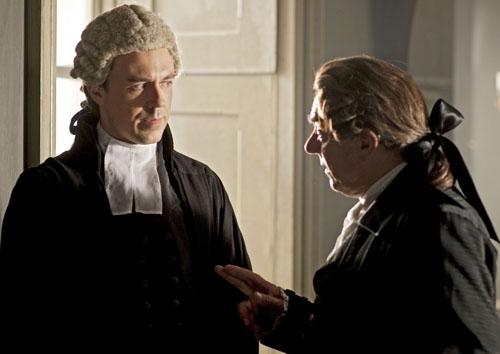With a Royal Television Society award in the bag for its first series, Garrow’s Law has shifted up a gear with a batch of new stories about such momentous issues as homosexuality in the 18th century, the callous treatment of injured servicemen and attitudes to women in a supposed Age of Enlightenment. Episode one (of a measly four) squared up to the horrors of slavery, as crusading barrister William Garrow (Andrew Buchan) picked apart the case of a mass drowning of slaves en route from West Africa to the Caribbean.
What gives the show its fascination, apart from its excellent ensemble cast and some exemplary dramatic writing by Tony Marchant, is the way it exposes the growing pains of the English law, which gives every impression of being a collection of protectionist regulations designed for the ease of the wealthy and powerful. The stories are based on real-life cases from the Old Bailey, and you have to marvel at the way Garrow not only created the concept of advocacy for the common person, but managed to sustain his efforts in the teeth of concerted campaigns to ruin his career. Buchan sometimes looks too young and naive to carry the weight of reforming the entire legal system single handed, but it's a vivid, beguiling performance.
The slavery case shed intriguing light on contemporary attitudes. Slaves were categorised as property, and were insured as cargo for their hazardous transatlantic crossing. Thus, though Captain Collingwood had thrown 133 of them overboard because there was supposedly not enough water to go round on his ship, there were no grounds for a charge of murder because you couldn’t murder cargo. Garrow, opposed as usual by sardonic prosecutor Silvester (Aidan McArdle), was acting on behalf of the Liverpool Assurance company which had paid out for the drowned slaves, on the understanding that Collingwood had been forced to dump them to save his ship. Or, as Garrow’s mentor and colleague John Southouse (Alun Armstrong, robust as nautical timber) resoundingly put it, “The insurance claim declared the ship was rendered foul and leaky, having been retarded by perils of the sea.” However, the insurance company had discovered evidence that the claim was false, and suspected the captain of negligence.
 Much moved by the anguish and indignation of the freed slave Gustavus Vassa (Danny Sapani, pictured right), Garrow took the insurance case as a proxy for trying to get some justice for the murdered victims, even though, as Vassa put it, “That is merely a mercenary business about the pecuniary value of negroes, not their right to live.” Garrow’s view was that you had to start somewhere.
Much moved by the anguish and indignation of the freed slave Gustavus Vassa (Danny Sapani, pictured right), Garrow took the insurance case as a proxy for trying to get some justice for the murdered victims, even though, as Vassa put it, “That is merely a mercenary business about the pecuniary value of negroes, not their right to live.” Garrow’s view was that you had to start somewhere.
Marchant has been alert to the perils of battering the viewer over the head with single-issue worthiness, and has kept the narrative pot boiling on the personal front too. The jealous obsession of Sir Arthur Hill (Rupert Graves) that his wife, Lady Sarah (Lyndsey Marshall), is having an affair with Garrow – he’s even convinced that Garrow is the father of their baby son - is thundering down on the impetuous barrister like a blazing tumbril packed with gunpowder. Hill has hired the sinister lawyer John Farmer (Anton Lesser) to inflict maximum grief on Sarah and Garrow, for instance by hitting Lady Sarah with a suit for “separation by bed and board”. Via this means, Farmer explained smirkingly, “Your wife will find herself in a ruinous state of limbo, where she is neither respectably married nor free to remarry and salvage her reputation.” The connection between Hill’s view of his wife as a mere chattel and the plight of slaves needed no spelling out, and Hill was naturally more concerned with potential damage to the slavery industry than with the fate of a few drowned Africans. Plenty of trouble ahead, Mr Garrow.















Add comment